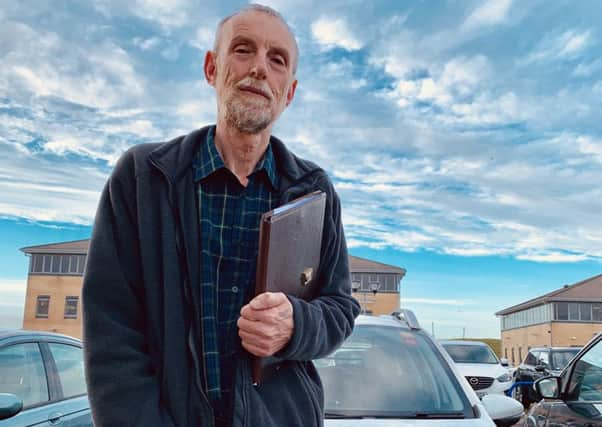Diocesan surveyor for the Church of England in Lancashire retires


Just retired Diocesan Surveyor for the Church of England in Lancashire, John Sunter, has been in the job since 2007 and it has been a responsibility he has relished.
The property team John led, part of the wider Enablers Team at the Diocesan Offices near Blackburn, has a reputation for being one of the best in the Church of England.
Advertisement
Hide AdAdvertisement
Hide AdThat’s a great tribute to John, a Yorkshireman who lives in Giggleswick, and one that won’t be held that against him!
John began his career with a degree in building surveying from Reading University, working variously for the government’s Property Services Agency in Leeds, Rosyth in Scotland and then Germany for five years, returning to the UK in 1989.
A spell with British Gas North Western in Bolton and Altrincham followed; then in 2006 John saw the job with the Diocese advertised and the rest is history.
The property team John has headed up principally serve the clergy of the Diocese and over the years John has become a very familiar face; calling on scores of clergy across the County as he has helped to ensure their homes are well-maintained.
Advertisement
Hide AdAdvertisement
Hide Ad“I imagined at first the job would include looking after churches, but the responsibilities extended only to properties that are neither places of worship or church halls: the vicarages and the land that the church in Lancashire owns,” said John.
“I was also expecting to be managing a process of decline – with pressure from falling church membership, I thought the church would need less buildings.
“While land and property has been sold over the years and most of the large, Victorian vicarages in our Diocese are now long gone, these have been replaced by the purchase or building of more modern homes fit for purpose and for clergy families.
“And now, with our Diocesan Vision 2026 Healthy Churches Transforming Communities, our wider narrative is about growth in the church, not decline.”
Advertisement
Hide AdAdvertisement
Hide AdJohn continues: “Meanwhile we have developed our other services to parishes such as HR, safeguarding and communications, as well as the property team itself, to new and improved levels from when I joined in 2006. In addition, the wider Diocesan staff team moved to fit-for-purpose offices on the outskirts of Blackburn three years ago.
“In short, I think we have become a more robust and, I think, better organised institution since 2006,” said John.
John’s former team at the Diocesan Offices in Clayton House arranges and prepares the ‘quinquennial reports’ (a church word for a survey carried out on a regular basis every few years) on vicarages and curates’ houses. This continual cycle of repair and maintenance is to ensure that church property is maintained to a good standard.
The properties are primarily houses, and about 80 parcels of what is called ‘Glebe Land’ in various separate locations that have historically been acquired by the Church of England.
Advertisement
Hide AdAdvertisement
Hide AdThe work of the property section is often unsung, under the radar project work that is vital and needs to be done but often is not noticed by the wider Diocese.
Asked to consider significant achievements during his time at the Diocese, John’s response demonstrates this well when he says: “I reckon one of the biggest things we have achieved in my time is as simple as equipping all the houses with modern and efficient gas boilers.”
There are around 200 vicarages and 50 other houses for which John was responsible. About 50 quinquennial reports on these properties are prepared each year; and then there is a process of collating the results and arranging for work to be carried out to implement the recommendations of those reports.
It’s a busy job and John’s former team has also been - and under John’s successor, Michael Kellet remains - responsible for (deep breath) maintaining technical records and forward maintenance plans; identifying and project-managing development opportunities and providing specialist property support; buying and selling of all Diocesan property; larger reactive repairs to houses; managing problems in gardens and boundary disputes; house lettings during periods of vacancy and dealing with issues regarding glebe land!
Advertisement
Hide AdAdvertisement
Hide AdThat’s a lot of balls to keep juggling and John is proud of the fact that it is generally recognised in church circles the standard of properties and the service our property section provides is one of the best in the Church of England.
“We have always been aware here in Blackburn that property kept in reasonable condition is an important factor in recruitment of a Vicar or Curate: if you are considering moving your family into a vicarage it goes without saying that it should be in good condition – and we have always strived to ensure this is the case.
“I have also been adamant that things also get done quickly here in Lancashire and that is also important when considering where you are going to be based: knowing that any emergencies involving water, electrics or the building are dealt with in hours rather than days – it’s all part of the job and I know that will continue!”
John is looking forward retirement and his include plans to join the Giggleswick Gardening Group and doing much more walking in the stunning hills surrounding Giggleswick and nearby Settle, as well as further afield in the beautiful Yorkshire Dales.
Advertisement
Hide AdAdvertisement
Hide Ad“I have really enjoyed my time at the Diocese and working with my fantastic colleagues Sharon and Steph. I wish my successor Michael much success and hope he has found a strong foundation and existing structures on which to further build for the future.”